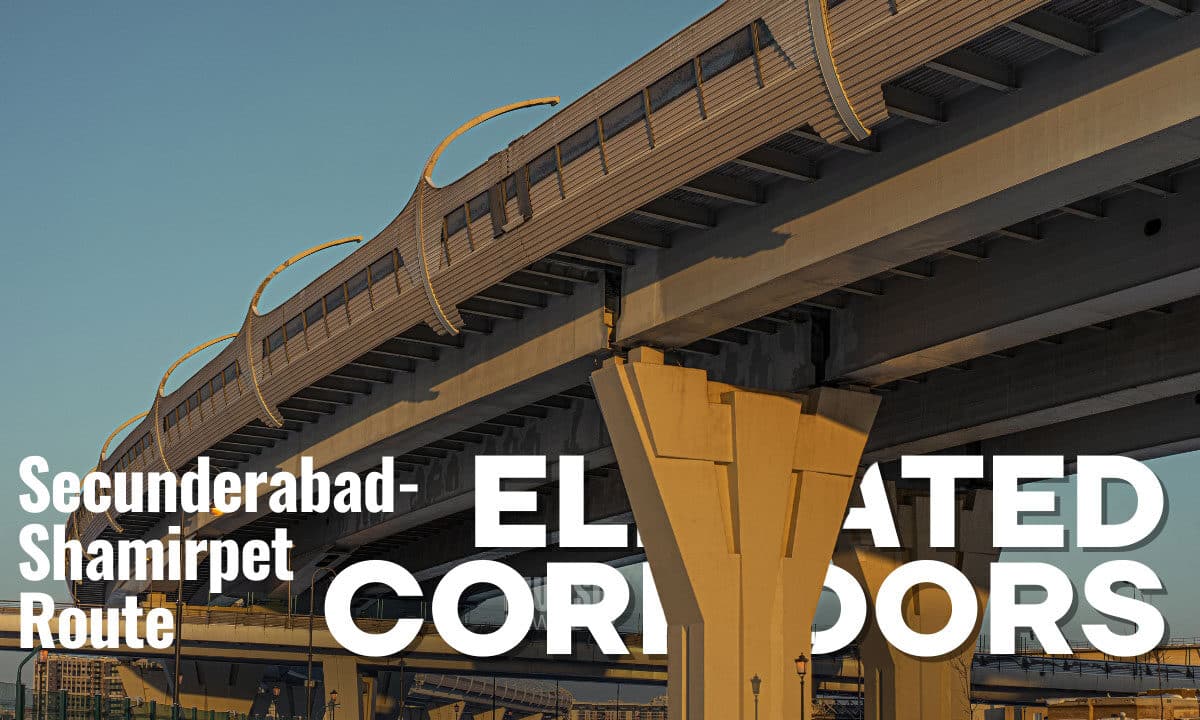Hyderabad Traffic: Two New Elevated Corridors to Ease Traffic Congestion on Secunderabad-Shamirpet Route
Two new Elevated Corridors from Paradise Junction to Shamirpet ORR are set to ease severe traffic in Hyderabad. Learn about the project cost, timeline, and impact on daily commuters.

HYDERABAD: The Telangana government is moving forward with two major elevated corridor projects aimed at significantly reducing traffic congestion in the northern parts of the city. The Elevated Corridors, planned from Paradise Junction in Secunderabad towards the Shamirpet Outer Ring Road (ORR), are now set to proceed after clearing a long-standing hurdle involving the transfer of defence land.
The ambitious infrastructure plan, with a combined investment of over ₹5,000 crore, is expected to transform daily commutes for thousands of residents and support the region’s economic growth.
Table of Contents
Defence Land Transfer Paves Way for Construction
A major breakthrough for the project was the successful negotiation for the transfer of defence land, an issue that had delayed progress for several years. The Ministry of Defence has approved the handover of approximately 160 acres of land required for the elevated corridor alignment.
In exchange, the Hyderabad Metropolitan Development Authority (HMDA) will provide an equivalent value of government land at other locations, primarily in Jawaharnagar. This strategic land swap agreement was crucial for advancing the project to the tender stage.
Project Details and Specifications
The plan includes two interconnected Elevated Corridors designed to streamline traffic flow and reduce travel time.
Elevated corridor 1: Paradise Junction to Shamirpet ORR
- Length: 18.10 kilometers
- Estimated Cost: ₹3,619 crore
- Design: A six-lane elevated structure with entry and exit ramps at key junctions. The design also includes provisions for a future Metro Rail line.
Eevated corridor 2: Paradise Junction to Dairy Farm Road
- Length: 5.4 kilometers
- Estimated Cost: ₹1,550 crore
- Key Feature: This section includes a 600-meter underground tunnel near Begumpet Airport. This design was approved by the Airports Authority of India (AAI) to ensure that the structure does not interfere with flight operations.
Addressing Hyderabad’s Worsening Traffic
These projects are a direct response to Hyderabad’s escalating traffic problems. The city’s road network is under immense pressure from a rapidly growing number of vehicles, which now stands at nearly 90 lakh.
The Paradise-Shamirpet route is one of the most congested in the city, with peak-hour travel times often exceeding 45 minutes. The new Elevated Corridors aim to cut this journey time by more than half, allowing for a smoother, signal-free commute.
Construction Timeline and Next Steps
With the land acquisition process nearing completion, authorities are preparing to call for construction tenders. Preliminary works, such as the construction of compound walls along the defence land boundaries, have already begun.
Once the main construction tenders are finalized, the project is expected to be completed within a 36-month timeframe. Officials are planning a phased construction approach to minimize disruption to the existing traffic flow in densely populated areas like Secunderabad, Trimulgherry, and Tadbund.
Environmental and Social Impact
The project will involve the removal of over 10,000 trees along the alignment. However, a significant conservation effort is planned.
- Tree Felling: Approximately 3,298 non-native trees will be felled after receiving approval from the Forest Department.
- Tree Translocation: Over 4,200 trees, including valuable species like neem, will be carefully uprooted and moved to new locations such as the Nehru Zoological Park and Hakimpet Sports School.
Additionally, around 251 private properties will be acquired for the project. The HMDA has stated that the land acquisition process is about 70% complete.
Strategic Benefits for the City
Beyond easing daily traffic, the Elevated Corridors are expected to provide a major boost to the region’s economy. The improved connectivity will particularly benefit Genome Valley, Hyderabad’s hub for pharmaceutical and biotechnology companies.
By reducing travel time and improving logistics, the project will support the thousands of professionals commuting to this vital economic zone. The enhanced infrastructure is also expected to spur further development in Hyderabad’s northern districts.
